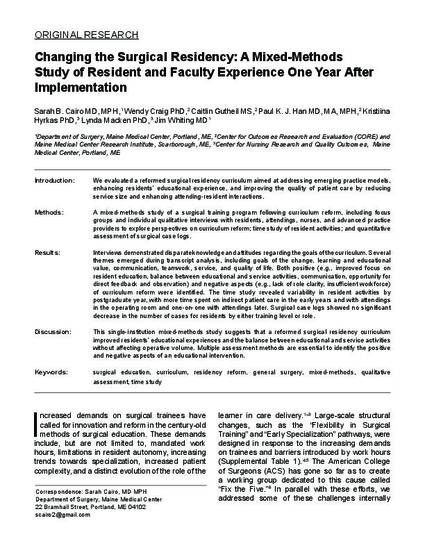
Objective: To evaluate a reformed surgical residency curriculum aimed at addressing emerging practice models, enhancing residents’ educational experience, and improving the quality/continuity of patient care by reducing the service size and enhancing attending-resident interactions.
Methods: A mixed-methods study of the surgical training program following curriculum reform including: 1) focus group and individual qualitative interviews with residents, attendings, nurses, and advanced practice providers to explore stakeholder perspectives on curriculum reform, 2) time study of surgical resident activities, and 3) quantitative assessment of surgical case logs.
Results: Qualitative interviews demonstrated disparate knowledge and attitudes regarding the goals of the curriculum with emergence of several themes during transcript analysis including: Goals of the Change, Learning and Educational Value, Communication, Teamwork, Service, and Quality of Life. Both positive aspects of curriculum reform (e.g., improved focus on resident education and balance between educational and service activities, communication, and opportunity for direct feedback and observation) and negative ones (e.g., lack of role clarity, insufficient workforce) were identified. Despite limitations, the time study revealed variability in resident activities by post-graduate year with more time spent on indirect patient care activities in the early years and more time in the OR and one-on-one with attendings later. Quantitative analysis of surgical case logs, previously published, showed no significant decrease in number of cases for residents by either training level or role.
Conclusions: This single-institution mixed methods study suggests that a reformed surgical residency curriculum improved residents’ educational experiences and the balance between educational and service activities without affecting operative volume. Multiple modalities of assessment are essential to identify the various positive and negative aspects of an educational intervention.
Available at: http://works.bepress.com/james-whiting/2/
